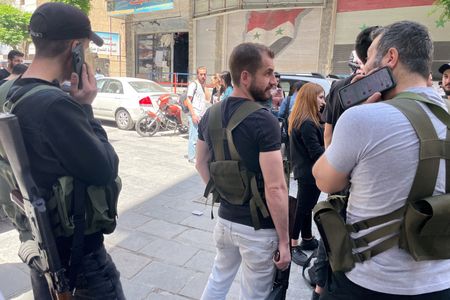BUCHAREST (Reuters) – Romanians vote in the first round of a presidential election on Sunday, with a second round run-off expected to be held on May 18.
There are 11 candidates vying for the presidency, whose powers include oversight of foreign policy and defence spending. These are the main contenders:
GEORGE SIMION
The 38-year-old leader of the radical right Alliance for Uniting Romanians (AUR) leads in opinion polls.
He opposes military aid to Ukraine, is critical of the European Union’s leadership and a supporter of U.S. President Donald Trump.
He has supported restoring Romania to its 1940 borders, which include territories now in Bulgaria, Moldova and Ukraine, and is banned from entering the latter two.
A conservative Christian, he supported a failed 2018 referendum to change Romania’s constitution to prevent same-sex couples from ever being able to marry.
Election authorities are looking into his campaign funding after he reported zero funds spent on online promotion despite evidence of paid content on social media platforms. He is also under scrutiny for potentially breaching privacy rules after Romanian pensioners were sent a letter on his behalf.
CRIN ANTONESCU
The 65-year-old former leader of the ruling coalition Liberal Party became a lawmaker in 1992 and has held political positions throughout his career until he retired from politics a decade ago.
He is backed by the leftist Social Democrats (PSD), his Liberals and the ethnic Hungarian party which make up Romania’s pro-western coalition government.
In 2012, alongside Victor Ponta, another presidential candidate who was then prime minister and PSD leader, Antonescu attempted to overthrow then centrist President Traian Basescu, which raised concerns over the rule of law in Brussels.
Antonescu briefly served as interim president but the impeachment referendum against Basescu ultimately failed.
After retiring from politics, Antonescu lived in Brussels with his wife Adina Valean, a member of the European Parliament who served as the EU’s transport commissioner.
Antonescu supports increase defence spending and supporting Ukraine while remaining firmly anchored in the EU and NATO. He supports the introduction of civil unions for same-sex couples.
NICUSOR DAN
Dan, 55, is a two-term mayor of capital Bucharest running as an independent centrist on an “Honest Romania” ticket with a staunch pro-EU and NATO stance.
The French-educated mathematician turned to activism to protect heritage buildings in the capital Bucharest before entering politics. He is campaigning on an anti-corruption ticket, eliminating red tape and merit-based reform of public administration.
He has been criticised for his relationship with businessman Mihai Paun, a longtime collaborator. Paun has in the past praised Russian President Vladimir Putin on social media and has had business dealings in Belarus and Russia.
Dan supports increasing defence spending to 3.5% of economic output in stages by 2030, from just over 2% in 2024, and supports Ukraine.
VICTOR PONTA
Ponta, 52, is a former leftist prime minister whose politics have turned ultranationalist.
Ponta, who quit as prime minister in 2015 after a deadly nightclub fire, and whose first presidential bid in 2014 was thwarted by his government’s bureaucratic hurdles to voting by Romanians abroad, has said he backs what he calls “radical change” taking place in the United States.
He said he would support increasing Romanian defence spending to over 3% of economic output in 2026.
He does not support the introduction of civil unions for same sex couples.
ELENA LASCONI
The 52-year-old mayor of the town of Campulung, in central Romania, Lasconi was the runner-up in the presidential election that was cancelled in December over accusations of Russian meddling in favour of the far-right frontrunner Calin Georgescu.
Lasconi has since lost support in opinion surveys. Executive members of her own party, the centre-right opposition Save Romania Union (USR), have withdrawn support for her in favour of Dan.
Lasconi believes in increasing defence spending and helping Ukraine. She has called the election cancellation a coup. She supports civil unions for same-sex couples, although she opposes legalizing marriage.
(Compiled by Luiza Ilie, Editing by Timothy Heritage)














